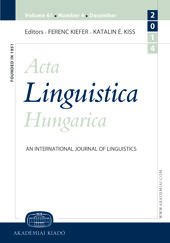The adaptive nature of ``meaning as understanding''
The adaptive nature of ``meaning as understanding''
Author(s): Gábor Győri Subject(s): Semantics
Published by: Akadémiai Kiadó
Keywords: cognition; semantic change; evolution; adaptation; semantic extension;
Summary/Abstract: In the paper I discuss semantic change as a cognitive adaptation process which flexibly adjusts the culturally shared conceptual category system of a language to changing conditions in the environment. I back up this view with the claim that the evolutionary function of cognition is to provide the organism with functional "knowledge" of its environment for the sake of adaptive orientation in a flexible way relative to the stability of environmental conditions. Hence, the cognitive function of language is to promote social cognition in order to facilitate the sharing of knowledge that proves functional and adaptive in the given physical, social and cultural environment of a group of individuals. In this light the cognitive function of the mental machinery of conceptualization and imagery-as the basis of meaning as understanding---is the adaptive construal of phenomena. Semantic leaps in the form of metaphor, metonymy and other kinds of meaning extension create new adaptive perspectives on the environment. When the circumstances triggering such novel usage persist, these perspectives will become conventionalized in the process of semantic change, leading to new established forms of functional and adaptive imagery.
Journal: Acta Linguistica Hungarica (Since 2017 Acta Linguistica Academica)
- Issue Year: 52/2005
- Issue No: 2-3
- Page Range: 199-220
- Page Count: 22
- Language: English

